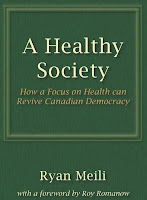We are aware of
how sufficient numbers of citizens and their perseverance can lead to real
political change; as well as the need for effective leadership to provide a
clear vision. For certain influential leaders such as Martin Luther King Jr.
during the civil rights movement, Nelson Mandela with the fight to end
apartheid, and Tommy Douglas who established Medicare in Canada, this vision
adopts a particular form of social justice. Recently, I finished reading “A Healthy Society” by Ryan Meili, a Saskatchewan doctor, which provided a short
but well-rounded primer on this subject.
While this book focused more on
improving overall health, as opposed to other important issues in political
discourse, it discussed how we need to focus on the determinants of health; key
among which is income distribution.
Two actions can be taken to address this,
the first of which is progressive taxation in which those earning higher
incomes are taxed at a higher rate. In 2012, the Canada Revenue Agency taxed
incomes over $132 406 at 29%, while incomes between $10 822[1]
and $42 707 were taxed at 15%.
The second course of action is to improve
pre-tax income parity. A good way to measure this is the CEO to Average Employee Multiple, in which you divide the salary of CEO’s by that of the
average employee. In Canada, this multiple is 204, which makes it more equal than
the United States (350) but less equal than the United Kingdom (84) and Japan
(67).[2]
Through effective progressive taxation, governments can purchase in
bulk, which reduces per unit costs and makes public services cheaper to operate
than their private counterparts. Per an OECD report, the United States – which
lacks universal health care – had health expenditures equal to 16% of GDP in
2007. For all other OECD countries, that rate ranged from 6% to 11%, with
Canada’s at 10%.[3]
A universal health care system alone is insufficient to improve overall health.
We also need to focus on prevention to reduce or eliminate the need for expensive medical procedures later on. Not
to mention, crime and incarceration can be reduced. Depending on your passion,
here are some prevention causes you can advocate:
- Affordable housing
- Public transit
- Active transportation infrastructure
- Expanded Medicare to cover prescription drugs, dental, vision, and seniors’ care
- Lower post-secondary tuition fees and increased financial assistance
- Help new graduates find employment via training subsidies and improved school-employer collaboration
Given the abundance of prevention causes, it is clear health is interrelated
to other key political issues such as education, the environment, and the
economy.
As is the case with healthy eating and exercise, the decision to be
politically active and how to accomplish it is up to you.
Until then, hope you
enjoy your summer!
Follow @RZaichkowski
[1]
$10 822 is the federal basic exemption amount; below which no tax is collected.
This does not account for employment insurance, Canada Pension Plan, and other
deductions.
[2]
David Zeiler. “CEO Pay Now $7,000 an Hour – 350 Times the Average Worker’s.”
http://moneymorning.com/2013/04/19/ceo-pay-now-7000-an-hour-350-times-the-average-workers/
[3]
Hugh Mackenzie & Michael Rachlis. “The Sustainability of Medicare.” Chart
on page 47.
http://www.nursesunions.ca/sites/default/files/Sustainability.web_.e.pdf


No comments:
Post a Comment